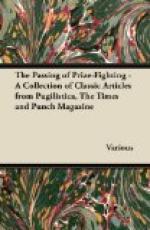* * * * *
There was at first a little danger of my being put off Fruit of Earth (METHUEN) by the uneasy manner of its opening chapters and a style that it is permissible to call distinctly “fruity.” Thus on page 5 J. MILLS WHITHAM is found writing about “an astonishment that nearly smudged the last spark of vitality from a hunger-bitten author,” and a good deal more in the same style. But I am glad to say that the tale subsequently pulls itself together, and, despite some occasional high-falutin, becomes an interesting and human affair. It is a story of country life, the main theme of which is a twofold jealousy, that of the chronic invalid, Mrs. Linsell, towards the girl Mary, whom she rightly suspects of displacing her in the thoughts of Inglebury; and that of Amos, who marries Mary, towards Inglebury, whom he rightly suspects of occupying too much room in the reflections of his wife. In other words, the simple life at its most suspicious, with the rude forefathers of the hamlet supplying a scandalous chorus. The strongest part of the story is the tragedy, suggested with a poignancy almost too vivid, of the wretched elder woman, tortured in mind and body, morbidly aware of the contrast between her own decay and the vitality of her rival. As to Inglebury and Mary, the causes of all the pother, they struck me as conspicuously unworth so much fussing over; and, when their final flight together landed them—well, where it did, I could only feel that the neighbourhood was to be congratulated. But, as you see, I had by this time become unwillingly interested. So there you have it; an unequal book, about people unattractive but alive.
* * * * *




